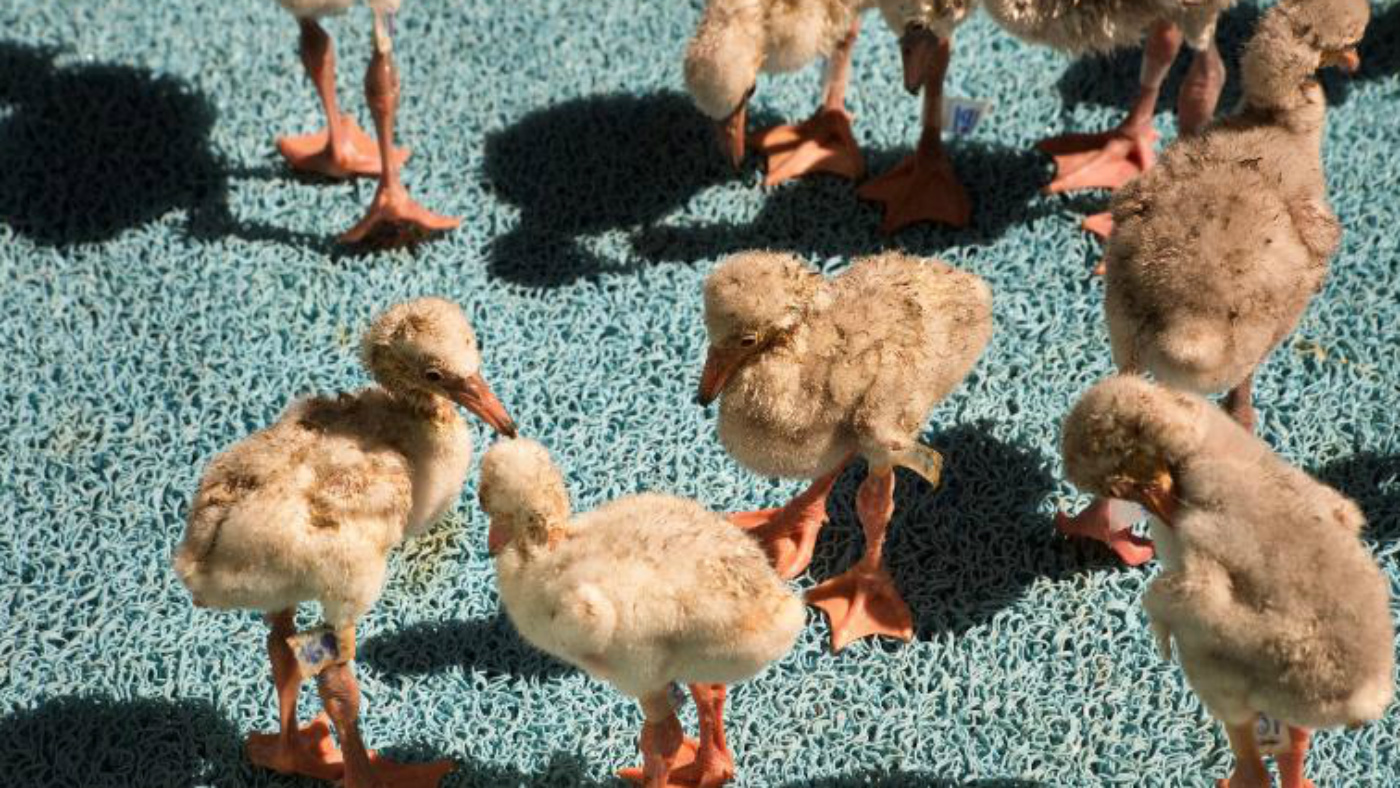Conservationists fight to save 2,000 baby flamingos evacuated from dried-out dam
The birds are being hand-reared by volunteers around Cape Town

A free daily email with the biggest news stories of the day – and the best features from TheWeek.com
You are now subscribed
Your newsletter sign-up was successful
Volunteers and conservationists are battling to save 2,000 baby flamingo chicks rescued from a dried-out reservoir in drought-hit South Africa.
Around 2,000 Lesser Flamingo juveniles were airlifted from the Kamfers Dam, near Kimberley in the Northern Cape, after being deserted by their parents as dam waters dried up. The chicks were transported almost 600 miles, by plane and by car, to a variety of locations around Cape Town.
Nicky Stander, rehabilitation manager at the Southern African Foundation for the Conservation of Coastal Birds (SANCCOB), said her team immediately took action after hearing about the birds’ plight in January. The foundation “works toward the rehabilitation and release of the birds” back into the wild, says CNN.
The Week
Escape your echo chamber. Get the facts behind the news, plus analysis from multiple perspectives.

Sign up for The Week's Free Newsletters
From our morning news briefing to a weekly Good News Newsletter, get the best of The Week delivered directly to your inbox.
From our morning news briefing to a weekly Good News Newsletter, get the best of The Week delivered directly to your inbox.
“As time goes on and they grow, we are going to have to adapt the way that we house them and make sure that they have long running space, so they can exercise their legs,” Stander told the news network.
A number of the fragile birds are being cared for in incubators at the foundation’s rescue centre in Cape Town.
“These chicks arrived in a very bad condition since a lot of them were dehydrated, they were tiny - some of them were just coming out of their eggs - so we had a little bit of a problem with infections,” said SANCCOB research manager Katta Ludynia.
But she added that are all now stabilised, and are getting medical treatment and regular feeds of egg yolks, baby formula, prawns and fish. The chicks are also fed electrolyte fluids to aid their rehydration.
A free daily email with the biggest news stories of the day – and the best features from TheWeek.com
The conservationists hope to “release the chicks in Kimberley or in the Western Cape after three or four months, by when the birds would have gained their strength and grown enough to be released”, reports the International Business Times.
The team learned last month that excessive heat was causing birds’ eggs in the reservoir “to lose their cool, moist protective covers”, and the inner membranes to harden, says Sky News.
The change in the shells made it difficult for baby flamingos to peck their way out, and “predators such as meerkats, dogs and hawks” were waiting for the exhausted chicks, further cutting their odds of survival, the broadcaster adds.
Nevertheless, “some conservation experts have questioned the decision to intervene”, reports The Guardian.
“These endearing little birds were apparently left stranded and dying by their parents as the waters of the dam dried up,” said Mark Anderson, CEO of BirdLife South Africa.
“[But] was the decision to step in and remove the abandoned chicks and eggs the right one? Who made this decision, under what authority and in terms of what expertise?”
Despite such doubts, SANCCOB volunteer Leslie Ernst said that she and fellow helpers were determined to do their best for the rescued chicks.
“They’re super-delicate-feeling. Every time I go to bed I still feel them in my hands,” she said. “I think we all feel very motherly towards them all.”
-
 Local elections 2026: where are they and who is expected to win?
Local elections 2026: where are they and who is expected to win?The Explainer Labour is braced for heavy losses and U-turn on postponing some council elections hasn’t helped the party’s prospects
-
 6 of the world’s most accessible destinations
6 of the world’s most accessible destinationsThe Week Recommends Experience all of Berlin, Singapore and Sydney
-
 How the FCC’s ‘equal time’ rule works
How the FCC’s ‘equal time’ rule worksIn the Spotlight The law is at the heart of the Colbert-CBS conflict
-
 Epstein files topple law CEO, roil UK government
Epstein files topple law CEO, roil UK governmentSpeed Read Peter Mandelson, Britain’s former ambassador to the US, is caught up in the scandal
-
 Iran and US prepare to meet after skirmishes
Iran and US prepare to meet after skirmishesSpeed Read The incident comes amid heightened tensions in the Middle East
-
 Israel retrieves final hostage’s body from Gaza
Israel retrieves final hostage’s body from GazaSpeed Read The 24-year-old police officer was killed during the initial Hamas attack
-
 China’s Xi targets top general in growing purge
China’s Xi targets top general in growing purgeSpeed Read Zhang Youxia is being investigated over ‘grave violations’ of the law
-
 Panama and Canada are negotiating over a crucial copper mine
Panama and Canada are negotiating over a crucial copper mineIn the Spotlight Panama is set to make a final decision on the mine this summer
-
 Why Greenland’s natural resources are nearly impossible to mine
Why Greenland’s natural resources are nearly impossible to mineThe Explainer The country’s natural landscape makes the task extremely difficult
-
 Iran cuts internet as protests escalate
Iran cuts internet as protests escalateSpeed Reada Government buildings across the country have been set on fire
-
 US nabs ‘shadow’ tanker claimed by Russia
US nabs ‘shadow’ tanker claimed by RussiaSpeed Read The ship was one of two vessels seized by the US military